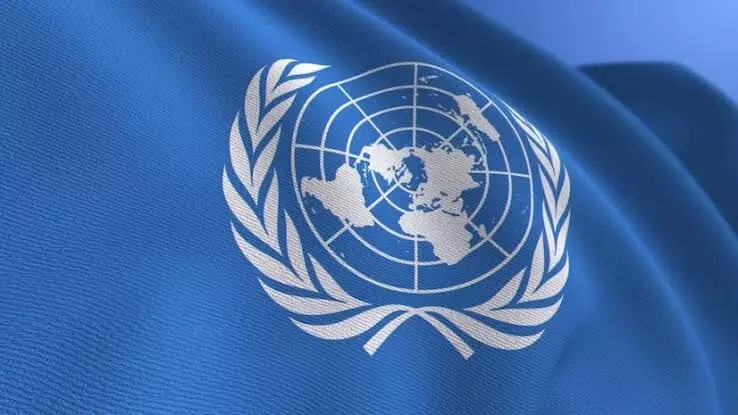India ramps up efforts for UN listing of LeT front The Resistance Front; Indian team meets top UN counter-terror officials

United Nations: An Indian delegation met top officials of the UN Office of Counter-Terrorism (UNOCT) and Counter-Terrorism Committee Executive Directorate here even as New Delhi stepped up efforts to designate The Resistance Front, an LeT proxy, as a UN-listed terror outfit. The Resistance Front (TRF), a front for Pakistan-based terrorist group Lashkar-e-Taiba (LeT), had claimed responsibility for the attack that killed 26 people in Jammu and Kashmir's Pahalgam. “An Indian technical team, which is in New York, interacted today (Wednesday) with the Monitoring Team of the 1267 Sanctions Committee and other partner countries in the UN. They also met with the United Nations Office of Counter-Terrorism (UNOCT) and Counter-Terrorism Committee Executive Directorate (CTED),” sources told. A readout from UNOCT and CTED of the meeting with the Indian team Wednesday, provided to PTI, said that United Nations Under-Secretary-General Vladimir Voronkov of the Office of Counter-Terrorism and Assistant Secretary-General Natalia Gherman of the Counter-Terrorism Committee Executive Directorate “met with a delegation of the Government of the Republic of India.”
The development comes in the wake of the horrific April 22 terror attack in Pahalgam and the retaliatory Operation Sindoor launched by India targeting terror infrastructure in Pakistan and Pakistan-occupied Kashmir. India's push at the UN also comes after the UN Security Council issued a Press Statement in which the members had condemned the Pahalgam attack “in the strongest terms” but did not mention TRF as the group responsible for the attack. Voronkov and Gherman expressed condolences for the April 22 attack. “The discussions with the Indian delegation focused on ongoing collaboration with CTED and UNOCT within their respective mandates, particularly in support of implementing key Security Council counter-terrorism resolutions and the UN Global Counter-Terrorism Strategy,” the readout said. It added that key areas of cooperation include UNOCT-led technical capacity-building initiatives supported by India—such as cybersecurity, countering terrorist travel, supporting victims of terrorism, and countering the financing of terrorism.
The participants also discussed efforts to counter the use of new and emerging technologies for terrorist purposes, in line with the 2022 Delhi Declaration adopted by the Counter-Terrorism Committee under the Chairmanship of India. This includes the development of non-binding guiding principles—prepared with CTED’s support—on threats posed by unmanned aircraft systems and the use of emerging financial technologies for terrorist activities. Pakistan is currently a non-permanent member of the Security Council and will preside over the powerful 15-nation body in July. Several Pakistan-based terror entities and individuals are listed under the 1267 Al Qaida Sanctions Committee of the UN Security Council and are subject to an assets freeze, arms embargo and travel ban. In the past, veto-wielding permanent UNSC member China, a fair weather friend of Pakistan, has often put holds and blocks on proposals submitted by India and its partners like the US to blacklist Pakistan-based terrorists at the UN. The 1267 ISIL (Da’esh) Al-Qaida Committee oversees the sanctions imposed by the Security Council.
The Committee comprises all 15 members of the Security Council and makes its decision by consensus. The Committee is mandated, among other things, to oversee the implementation of the sanctions measures and designate individuals and entities who meet the listing criteria set out in the relevant resolutions. Following the Pahalgam attack, the UN Security Council had on April 25 issued a Press Statement on ‘terrorist attack in Jammu and Kashmir’ in which the members had “condemned in the strongest terms” the terrorist attack..“The members of the Security Council underlined the need to hold perpetrators, organisers, financiers and sponsors of this reprehensible act of terrorism accountable and bring them to justice,” the press statement had said. However, the press statement did not mention TRF as the group responsible for the attack after Pakistan managed to get the name removed. Foreign Secretary Vikram Misri, during a briefing on Operation Sindoor last week, had said that The Resistance Front (TRF) had claimed responsibility for the Pahalgam attack. This group is a front for the UN-proscribed Pakistani terrorist group, Lashkar-e-Taiba. “It is notable that India had given inputs about the TRF in the half-yearly report to the Monitoring Team of the UN's 1267 Sanctions Committee in May and November 2024, bringing out its role as a cover for Pakistan-based terrorist groups. “Earlier too, in December 2023, India had informed the monitoring team about LeT and Jaish-e-Mohammad operating through small terror groups such as the TRF,” Misri had said. Misri had underlined that Pakistan's pressure to remove references to TRF in the April 25 UN Security Council Press Statement is “notable” in this regard. UNOCT was established in June 2017 and its main functions include enhancing coordination and coherence across the Global Counter-Terrorism Coordination Compact entities; strengthening the delivery of United Nations counter-terrorism capacity-building assistance to Member States and improving visibility, advocacy and resource mobilisation for United Nations counter-terrorism efforts. The Security Council established the Counter-Terrorism Committee Executive Directorate (CTED) to assist the work of the Counter-Terrorism Committee (CTC), which was established by Security Council resolution 1372 (2001), adopted unanimously in September 2001 in the wake of the September 11 terrorist attacks in the United States.



